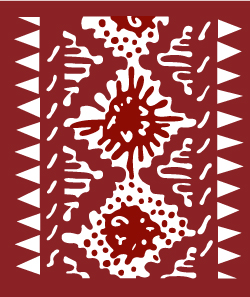Wednesday, 6th April, 2022
“How fortunate, getting to hear 1) about Ramadhan, 2) in a mosque and 3) during the month of Ramadhan,” enthused Azliza, one of our speakers at the Federal Territory mosque. We were also fortunate to hear about Ramadhan from women’s perspectives this year during MCG’s Introduction to Ramadhan event held recently in April.
Azizah, our other speaker who is also an MCG member, sees the fasting month as a blessed month, to which Muslims look forward. It has special meaning to Muslims, who are required to fast (not eating, drinking or having sexual relations during daylight hours) unless they are unable to. God began revealing the Qur’an through the angel Gabriel to Prophet Muhammad during Ramadhan and Muslims try to read and spend more time studying the Qur’an during this month as part of their worship. Ramadhan is seen as a gift from God as the true message is to be closer to God, to create a greater consciousness of God. It is a unique experience and Muslims value the gift that comes once a year. It is more than a time of deprivation as they strive to purify the soul and live virtuously and with humility. It is not a time for gossip and lies, but a time for self-reflecting and aiming for better behaviour. It is a time for up-lifting yourself, especially your tongue. If someone wants to argue with you, just say, “I’m fasting.” She outlined three ways to uplift yourself while fasting; 1) trying to read and study the Qur’an, 2) focusing on remembrance of God, emphasizing our upward relationship with God rather than our sideways relationship with people and 3) viewing it as an act of worship. She pointed out that people can’t show off while fasting, whereas people can show off by praying at a mosque where they can be seen.

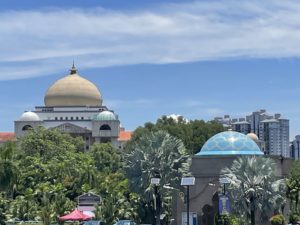
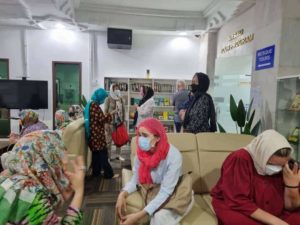
This ninth month of the twelve lunar months also involves being conscious of your community and the need for generosity and appreciation of the burdens of others. Zakat fitrah, a tithe, is paid to ensure that the poor can break their fast at sunset. The family is emphasized as people want to break their fast together as well as take the last meal of the day together just before sunrise. These beliefs and practices are seen as acts of worship which also strengthen family bonds.
Aliza took over to give us some of the details about the practice of fasting. God blesses the worshippers who try to get close to God to get his mercy and forgiveness. It is believed that one night of worship in Ramadhan is worth more than worship in a thousand other nights. Who fasts? All adults who are mentally sound and in good health are expected to observe the fast. Exemptions are made for the sick, menstruating women, breastfeeding and pregnant women and others. Days missed need to be replaced. Travelers are also exempted. Fasting is not obligatory before puberty. What is involved? One abstains from food, drink and sexual relations during the day and this includes smoking. Sahur, an early breakfast, must be taken before sunrise and it is followed by morning prayer. The fast ends at sunset and one shouldn’t delay in breaking the fast but rather do it immediately. She pointed out that Muslims should purify their manners, there should be no swearing or ill intent as it is a chance to detoxify the heart. Charity, not only in the form of money, but by helping people is an important aspect of Ramadhan. Providing food for the poor or for orphanages or those in need is common. It is believed that the reward of the person you help is added on to yours.
She referred to the Qur’an as a user manual for Muslims, who are encouraged to read and understand it with the intent to finish the whole book in the month. This is usually done by reading one juz, one of the 30 divisions of the Qur’an, per day. She explained that reading it is God talking to us. Azliza pointed out that the revelation by Gabriel of the first verses of the Qur’an to Muhammad occurred on one of the 10 last nights of the fasting month. This night has become very special and is referred to as Laylat al-Qadr (Night of Light) or Shab-e-Qadr (Night of Destiny or Night of Power). It is observed on the 27th day of Ramadhan and is considered the holiest night of the year. Worship on this night is considered greater than 1000 months of normal worship. The opportunity for the few hours of prayer and worship are considered the greatest gift from God. More effort in prayers is observed on the odd nights during the last 10 nights, for instance on the 21st, the 23rd and so on. One can stay for many hours in the mosque and focus on going all out in praying, trying to get closer to God and to his mercy and forgiveness. God will always forgive when he is asked as shown by Gabriel.
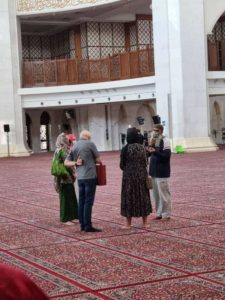
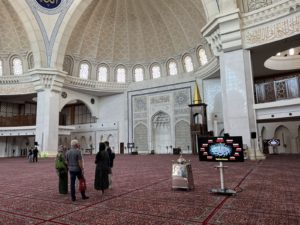
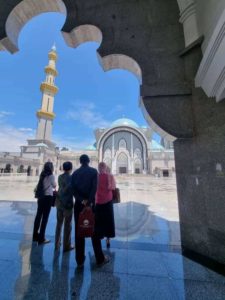
After the presentations by the two ladies, we were split into four groups to tour the mosque. I was in the group led by Azizah.
In the 1990s KL had no state mosque and Tun Dr. Mahathir, as Prime Minister, was behind the project to build the 44th mosque in the city. Although bigger than Masjid Negara, it is recognized as a State Mosque and run by the government. In the planning stages, officials were sent out to India, Iran, Turkey, Egypt, Morocco and the Arab Emirates to cull ideas from Islamic architecture and examples of grand mosques. The result is an eclectic design that combines ideas from afar as well as Malaysian elements. There are three design elements found in mosques; geometric (frequently followed by Arabs), arabesque (flowers, floral elements created with semi-precious stones) and calligraphic (stylized Arabic). The Federal Territory Mosque blends all three with stunning results. The main entrance, façade A, displays all three; Arabic calligraphy rises in a circular arch framing the doors, each doorway is mounted by arabesque panels of flowers and leaves (which were created by craftsmen from India, descendants of the artisans who worked with the semi-precious stones at the Taj Mahal) and geometry is seen in the recesses for the niches of the three doorways.
The five-hectare complex sits on a hill that was formerly a site for a court and government offices. Construction was started in 1997 and completed in 2000. It was built in four layers, with the highest culminating in the prayer hall. The five entrances, a moat and surrounding gardens make it an imposing complex. In all, there are 22 domes in the mosque and two towering minarets. Prophet Muhammad’s concept of a mosque in Medina was followed, in that it fulfills many of the needs of a community’s daily life. So, there is a centre of worship accessible to all, and many services are offered; a creche, a place for children to learn about Islam, space for a nikah (marriage ceremony), to be performed, space for an administration office, a library and an area for preparation for burial. Construction materials included many from Malaysia; pewter on the long door handles to the main prayer hall, wood for the doors hand carved by East Coast craftsmen from Kelantan and Terengganu and local granite for the verandahs and balconies.
The main prayer area takes your breath away with the central dome spanning 30 metres and rising 45. Several smaller and maximum the mosque can accommodate 17,000 worshippers, by making use of the verandahs and balconies, including the spacious marble forecourt in front of façade A.
Overall, it was an enjoyable, informative morning, giving us a chance to experience an inspiring place of worship. Our thanks go out to Azizah and Azliza as well as the gentlemen guides who led two of the groups through the mosque.
Leslie Muri
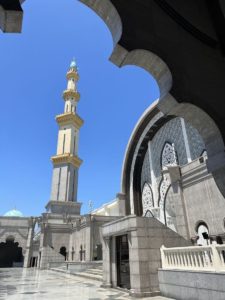
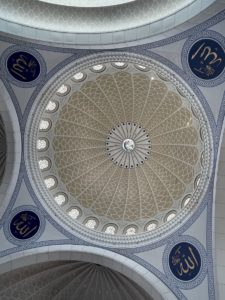
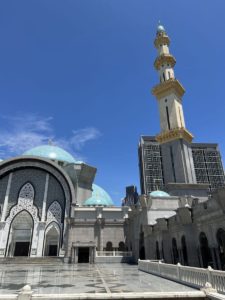
Information on visiting the Federal Territory Mosque (Masjid Wilaya Persekutuan)
+60 3 6201 8791
Mosque Tour Programme
Tours: free and guides speak English
Hours: mosque opens at 10:00 am, closes at 6:00 pm, last entry at 5:00
Closes for Friday prayers from 12:30 pm to 2:00 pm
Entry: at façade B, for visitors
Shoes: remove shoes once you reach the marble floor
Dress: women – dress conservatively, no bare arms, no bare legs, cover head.
The mosque will lend you a head scarf, and a cover up robe
Men – cover to below knee
One of our guides, Azzizah Mhd. Noor, has forwarded her WhatsApp number to us, in case you wish to organize a tour for your guests. Contact her at +60 17-887 0901.
